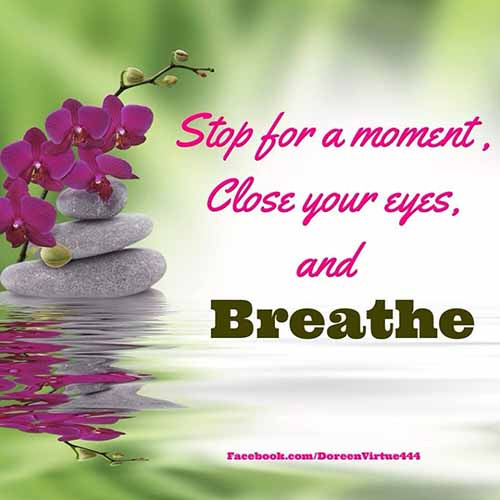We are a nation of chest breathers! As children we breathe correctly naturally. As we become adults however, we are taught to stand up straight, breathe and exhale, blowing out air, gradually breathing into our chest more and more.
Believe it or not, that is harmful to us. How many of us forget to breathe completely? Anxiety sufferers find it very difficult to breathe. What do we do when stressed? Forget to breathe. Nervous? Forget to breathe.
There is a right and a wrong way of breathing, and so many good reasons to breathe correctly. Once I share what they are, you will want to practice your breathing until it becomes second nature.
Dr. Andrew Weil received his MD from Harvard Medical School and has become an internationally recognised expert on mind-body interactions and is the author of nine books. Dr. Weil says: “If I had to limit my advice on healthier living to just one tip, it would be simply to learn how to breathe correctly.”
So how does breathing lead to our success, whether we are performers, directors of companies, power women, parents or children?
An article by Carol Krucoff, “Better living through belly breathing” ran in The Seattle Times, May 10, 2000:
Slow, deep breathing is a powerful anti-stress technique. When you bring air down into the lower portion of the lungs, where the oxygen exchange is most efficient, heart rate slows, blood pressure decreases, muscles relax, anxiety eases and the mind calms.
Carol Krucoff describes some of the medical benefits of breathing correctly. In addition to that, breathing correctly releases our resistance to things we truly want. Ever try to become unstuck somehow? The minute we give up, take a deep breath, our resistance dissipates and we are free! Sometimes we want things so badly we stop breathing and build resistance. That is the time to release it.
Most of us have a million thoughts running through our head. Sometimes our mind chatter is enough to drive us insane. Breathing deeply and slowly clears the mind and brings us right into the present. When we look around, we see everything become simpler.
Breathing correctly also aligns us with our source of creativity and inspiration. When we access that, we feel a sense of wellbeing, our creative juices flow and the ideas poor in, with exciting new possibility.
Breathing connects us with our inner being and our higher intelligence. It brings us home and the more we practice breathing correctly the more comforting it is. We can always check in and find our inner sanctuary. Breathing correctly brings us peace whether we are stuck in traffic, in a never ending queue, in an audition, in a make or break meeting, interview, or surrounded by screaming children.
Breathing correctly is imperative for people suffering from panic attacks, anxiety and depression. Breathing is generally hindered in these situations, causing serious health problems. Exercise, meditation and yoga will not only get the breath circulating, it will improve the mood and release endorphins, making us feel good!
So How Then Do We Breathe Correctly?
Here are some tips:
- Breathe into the diaphragm. That is under your ribs and right down into the abdomen
- Breathe slowly and hold for a second
- Breathe out slowly
- Resist breathing into your chest. You should see your belly inflate when you breathe
- Do not breathe too much, more than you need, as that can be harmful
- Practice breathing correctly with consistency, as it takes time to undo patterns gathered over years
Meditation is a great way to focus on your breathing. There are many ways to meditate. You may choose to sit in silence, focusing your gaze on a point like a candle flame. If you are too restless and new to meditation, there are innumerable guided meditations to listen to, as well as delta frequency meditations, working on your right and left brain, whilst guiding you through a meditation. Left/Right brain meditation has the added benefit of bringing balance to both spheres of the brain.
Breathing connects us with our inner being and our higher intelligence. It brings us home and the more we practice breathing correctly the more comforting it is
Whenever you are thinking too much, just breathe. The goal is to Be. When we are in the moment we can deal with any situation in a calm, relaxed state. Your breath is your loyal friend in the most dire circumstance.
Do you think that maybe an aid in your success? No doubt!
Wishing you amazing success and Great Health!
Featured photo credit: graphistolage via photopin cc
 Tula Tzoras
Tula Tzoras
Tula Tzoras, The Inspiration Genie is here to Unleash Your Full Expression. She is an Actor, Author, Speaker, Host, with a successful acting career behind her, starring in several of Australia’s top rating shows as actor and presenter. For more information, courses and coaching, please visit www.tulatzoras.com




